Steve Marshall joins 25 other Attorney Generals to fight Joe Biden’s proposed gun rule
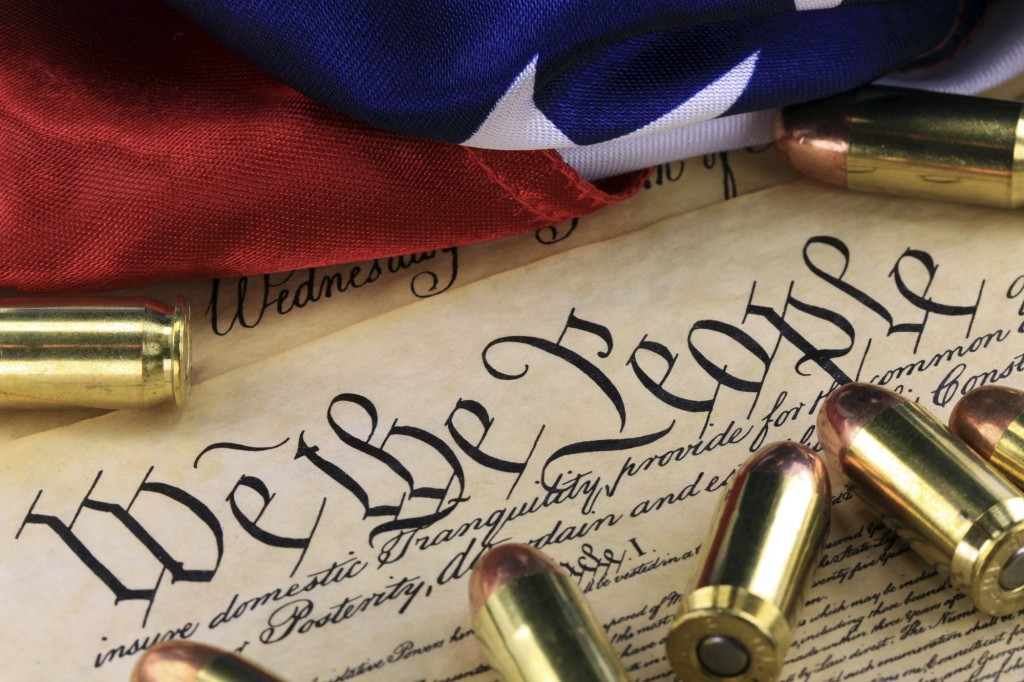
Twenty-six states sued the Bureau of Alcohol, Tobacco, Firearms and Explosives on Wednesday, arguing a new federal rule it’s implementing targets lawful gun owners and is unconstitutional and illegal. Texas and Kansas led two multi-state coalitions with Alabama Attorney General Steve Marshall joining the Kansas coalition; Florida filed its own lawsuit. Texas Attorney General Ken Paxton and Kansas Attorney General Kris Kobach announced their multi-state coalitions at a joint press conference in Frisco, Texas, on Wednesday. The announcement was the first time Paxton has held a press conference about official state business since he was impeached last year. Paxton was the first Texas attorney general to be impeached in state history after 60 Texas House Republicans joined nearly all Democrats to vote to impeach him on 20 counts. He was acquitted by the Senate last September. The states sued the ATF and the Department of Justice and their effective heads over a new ATF rule the Biden administration finalized on April 19. The administration argues the rule is implementing aspects of the 2022 Bipartisan Safer Communities Act spearheaded by Sen. John Cornyn, R-Texas. President Joe Biden has called for Congress to enact so-called “universal background check” legislation, which would require every private firearms transaction to be regulated by the federal government. Congress, under Democratic and Republican leadership, has repeatedly declined to do so. For decades, federal law has distinguished between firearms dealers, who are required to have a federal license to sell firearms, and private individuals who are not required to have a license to purchase and sell firearms privately. Claiming the new law as the basis for the rule, the ATF measure would require thousands of law-abiding citizens to register as dealers to buy, sell or trade firearms with friends and neighbors. The Republican attorneys general argue the rule is unconstitutional and burdens citizens with unnecessary costs. The Texas coalition includes Louisiana, Missouri, and Utah. Their lawsuit was filed in U.S. District Court Northern District of Texas Amarillo Division. The Kansas coalition includes Arkansas, Iowa, Montana, Alabama, Alaska, Georgia, Idaho, Indiana, Kentucky, Missouri, Nebraska, New Hampshire, North Dakota, Oklahoma, South Carolina, South Dakota, Tennessee, Virginia, West Virginia, and Wyoming. Their lawsuit was filed in U.S. District Court for the Eastern District of Arkansas Delta Division. Both lawsuits have gun owners included as plaintiffs. The Kansas coalition included newly re-elected NRA board member Judge Phil Journey. “Yet again, Joe Biden is weaponizing the federal bureaucracy to rip up the Constitution and destroy our citizens’ Second Amendment rights,” Paxton said. “This is a dramatic escalation of his tyrannical abuse of authority. With today’s lawsuit, it is my great honor to defend our Constitutionally-protected freedoms from the out-of-control federal government.” Kobach said, “Biden’s latest attempt to strip away the Second Amendment rights of Americans through ATF regulations will make many law-abiding gun owners felons if they sell a firearm or two to family or friends. This rule is blatantly unconstitutional. We are suing to defend the Second Amendment rights of all Americans.” In a separate statement, Florida Attorney General Ashley Moody said the rule was President Biden’s “latest step in trying to take guns away from law-abiding Americans. We are fighting back against this federal overreach that would force thousands of law-abiding gun owners to register as federal firearms dealers and navigate a federal bureaucracy. It’s unlawful and reflects a lack of respect for our Second Amendment rights. We won’t stand for it.” Florida sued in U.S. District Court Middle District of Florida Tampa Division. Its 16-page brief states the rule “goes far beyond the plain text of the BSCA. It purports to force thousands of law-abiding gun owners to register as federal firearms dealers and navigate a federal bureaucracy as a precondition to engaging in constitutionally protected activity. The challenged rule is unlawful…ATF does not have authority to promulgate it because ATF’s rulemaking authority is carefully circumscribed. But even if it did, the challenged rule unlawfully attempts to depart from the plain meaning of the BSCA to achieve President Biden’s policy goals.” All three lawsuits named the ATF, the Department of Justice, and their respective heads as defendants. They ask the courts to rule that the ATF rule is unlawful and to permanently enjoin the ATF from implementing it. This article was published with permission from The Center Square.
Senate votes to allow concealed handguns without permit

The Alabama Senate approved legislation Thursday that would end the state’s requirement for a person to get a permit to carry a concealed handgun in public. Senators voted 23-6 for the House-passed bill. The legislation now returns to the House of Representatives where members will decide whether to accept minor Senate changes to the bill. The proposal is championed by gun rights advocates who call it “constitutional carry” and argue that people should not have to get a permit, which requires a background check and a fee, to carry a concealed handgun. Opponents, including state sheriffs and others in law enforcement, said the permits help combat crime and enhance public safety. “It wasn’t meant for us to pay a fee, or a dime, or anything to be able to arm ourselves to protect our families, our properties. It’s a right,” Republican Sen. Gerald Allen said in reference to the Second Amendment. Republicans, who hold a lopsided majority in the chamber, cut off debate after an hour and forced a vote on the bill. “We are fixing to open ourselves up to the wild, wild west,” Sen. Rodger Smitherman, a Democrat from Birmingham, said. “You are going to literally have conflicts settled in wide-open shootouts because everybody is going to have their gun on them.” Proponents of the bill noted there are 21 states that allow concealed weapons in public without a permit. Opponents pointed to the state’s already high rate of gun violence. Alabama in 2020 had the country’s fifth-highest rate of gun-related deaths – including suicides and murders — with 1,141 deaths, according to numbers from the Centers for Disease Control and Prevention. “We’ve got a war going on right here in Alabama, and we want to add fuel to the fire,” Sen. Linda Coleman-Madison, a Democrat from Birmingham, said. Democratic Sen. Bobby Singleton of Greensboro, accused Republicans of kowtowing to political pressure from groups like the National Rifle Association. “The conservative party of the state of Alabama wants to defund the police … You are taking tools out of the toolbox to be able to protect citizens,” Singleton said. Permit fees have gone to sheriffs’ offices. One Senate change to the bill would steer $5 million in state funds to sheriffs’ offices to compensate for the funding loss. But Singleton said that would take money from other state needs. Alabama currently requires people to get a concealed carry permit, which requires a background check, to carry a handgun under their clothes or in a purse or bag when they go in public. The bill, sponsored by Republican Rep. Shane Stringer of Citronelle, would do away with the requirement, although people could still choose to get a permit if they wanted. It would also do away with the current requirement for people without concealed carry permits to keep handguns unloaded and secured when driving. The House of Representatives could give the legislation final approval as soon as next week. Proponents of the bill said the Alabama Law Enforcement Agency is developing a database, authorized by existing state law creating a lifetime concealed carry permit option, that officers will be able to use to flag people not legally entitled to carry a handgun. The president of the Alabama Sheriffs’ Association has said he does not think the database will effectively replace the safety checks provided by the permits. Amanda Wasden, a spokesperson for the Alabama Law Enforcement Agency, said the agency hopes to have the database operational by October 1. Republished with the permission of the Associated Press.
Alabama Sheriffs Association comes under fire for opposition of new gun legislation
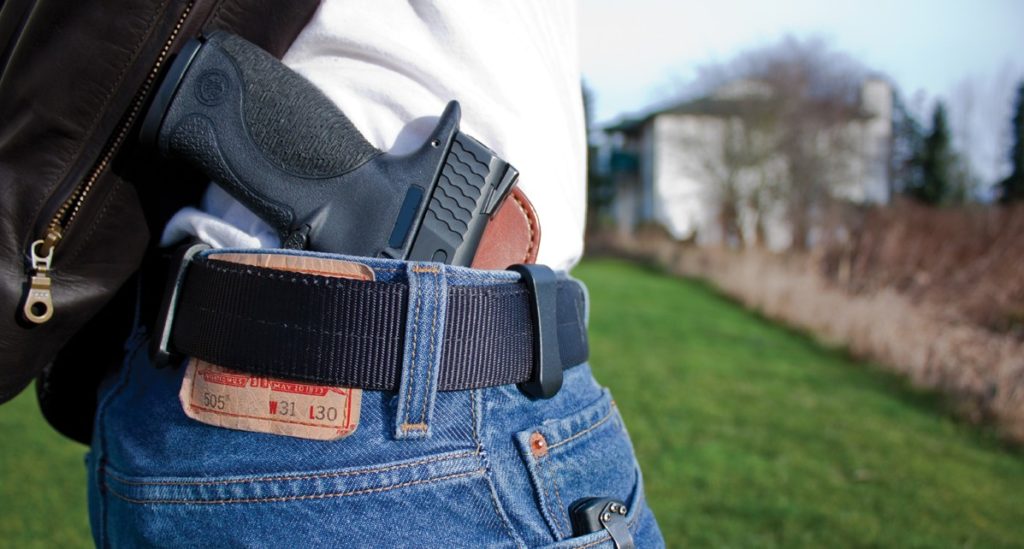
Alabama Sheriffs Association (ASA) director Robert ‘Bobby’ Timmons is coming under fire for his recent commentary on the new constitutional carry bills that have been set for debate in the Alabama legislature this year. There are currently three bills that have been pre-filed in the Alabama House and Senate that would legalize permitless or “Constitutional Carry” in the state. This means citizens would be able to legally carry handguns without having to purchase a permit from their local Sheriff’s office. In a recent 1819 report, Timmons was asked about his views on the Second Amendment, and Timmons commented that he believes that the amendment wasn’t meant to allow citizens to carry a concealed weapon. He believes the Second Amendment was written to allow citizens to defend their homes. When asked if ASA would support amending the Constitution to limit the Second Amendment to only allowing firearms for the defense of a person’s home, Timmons told 1819, “Oh yeah. I’d be in favor of that. But, I mean, it would never get passed.” Timmons argued that gun permits are a matter of public safety. He commented, “Absolutely without question for public safety just like a driver’s license, you need a driver’s license. If you don’t have a license, you can’t drive. If you don’t have a permit, you can’t carry a concealed gun.” When asked if permits were a revenue stream for Alabama Sheriffs, Timmons agreed, stating, “It buys ammo, vehicles, and bulletproof vests. If you get rid of the permits, the taxpayers will have to pick up the bill.” The National Association for Gun Rights (NAGR) has criticized the ASA for its opposition to Constitutional carry. Shane Stringer introduced one of the bills currently being considered. Stringer argued that some sheriffs are trying to hold onto the fees, but said people shouldn’t have to pay to exercise a constitutional right. “I don’t think we should be taxing people for carrying a gun,” Stringer said. “I am a firm believer that law-abiding citizens should not be punished and forced to get a permit to carry a firearm when the criminal element is not.”
Rauf Bolden: Should Orange Beach ban open & concealed carry at all city facilities

Shootings happen every day in America. I argue for a common-sense approach at municipal facilities, respecting our After-School Programs like Camp Sunshine and Expect Excellence. Columbine, Sandy Hook and Parkland are still fresh in our minds, banning open and concealed carry at city facilities makes sense, lowering the level of fear for adults and children inside. The Second Amendment gives American citizens the right to bear arms. “A well-regulated Militia, being necessary to the security of a free State, the right of the people to keep and bear Arms, shall not be infringed,” according to a report on The Cornell Law School web site. I agree with the Second Amendment, but I must ask in today’s world is a lone shooter a “well-regulated Militia”? Of course, he or she is not, especially in government buildings. “Generally, federal law prohibits a person from knowingly possessing or attempting to possess a firearm in a federal facility,” according to a report on Gifford’s Law Center web site. Several years ago, a man committed suicide outside of Community Development. He ended his life with a pistol in the front seat of his car, parked in the first space next to the front door. Could he have come into the office and opened fire on the city employees who refused his permit? Yes, he could have. In response to this threat management authorized construction of a bullet-proof podium in the Council Chambers at City Hall, giving the elected officials a place to duck down in the event a shooter opens fire during a council meeting. Yet, the front-desk personnel at Community Development are still unprotected. Open carry has strong support in Orange Beach. “In my opinion Orange Beach should not ban concealed or open carry weapons in city buildings or facilities,” said Tim Blackwell, former Planning Commissioner and current resident of Orange Beach in an email. “I am a supporter of our 2nd amendment rights personally. I support the right to bear arms to protect my family and country,” said four-term Orange Beach Council Member Jeff Silvers in an email. The city has no appetite for physically protecting facilities with TSA style security, arguing it costs too much, presenting an aura of suspicion when constituents pay sewer bills or apply for a business license. This is understandable. An ordinance costs nothing, putting a sign at the entrance to each building, providing legal notice of the policy. It’s simple, leave your guns locked in the car. The consequences of not taking action can lead to public hysteria at events held on city property. On Saturday morning, September 7, 2019, people at a Farmers Market in Old Town, Alexandria, Virginia feared for their lives as open-carry protesters (five men), brandishing fully-loaded assault rifles and pistols, walked through the market spreading fear by their presence, according to a report in Blue Virginia. Families ran not wanting to be the next headline on Fox News. To better prepare our community the Orange Beach Fire Department holds Active Shooter/Hostile Event Response (ASHER) classes, said Assistant Chief for Training Kevin Lanford in an email. An Ordinance banning firearms at city facilities is not without its obstacles. “The ‘Dillon Rule’ from 1868 prohibits local jurisdictions from adopting laws that are not specifically permitted in the state. This has prevented communities like Falls Church (Virginia) from preventing people from walking the streets or entering businesses with loaded guns,” according to a report in Blue Virginia. Open and concealed carry are not synonymous with municipal life in a vacation town espousing family values like Orange Beach. This city is branded on every street corner and brochure as family friendly, catering to tourists from around the world. Allowing citizens to carry open or concealed weapons into city facilities like the Event Center, the Art Center, or the Recreation Center is reckless. The city was able to ban short term rentals, citing Mayor Tony Kennon’s desire to know who his neighbors are. Perhaps banning open and concealed carry at city facilities is easy, pro-actively creating a: Guns-Free Zone, protecting the same neighbors from harm. Rauf Bolden is retired IT Director at the City of Orange Beach, presently pursuing his dream as a Web Technologies Consultant on the Beach Road. He can be reached by email: publisher@velvetillusion.com.
High-capacity magazines get new scrutiny as congress returns
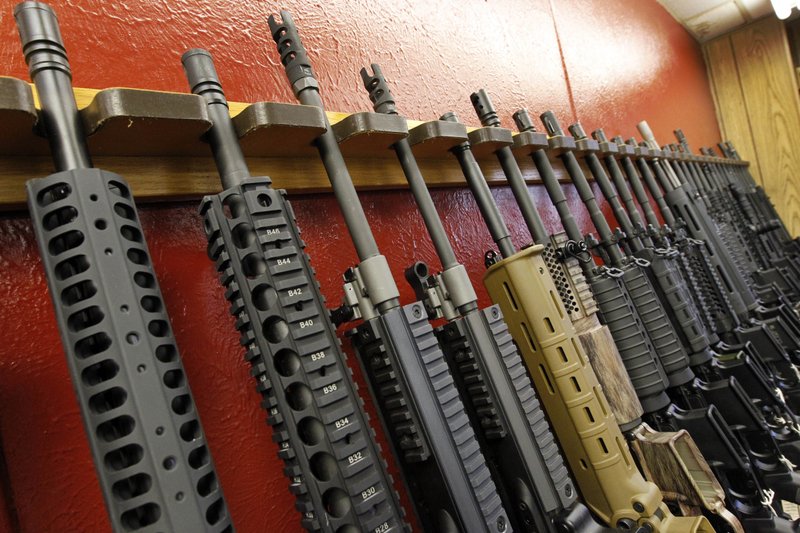
Lawmakers around the country are making a renewed push to ban high-capacity magazines that gunmen have used in many recent massacres, allowing them to inflict mass casualties at a startling rate before police can stop the carnage. Nine states have passed laws restricting magazine capacity to 10 to 15 bullets, and the Democratic-led U.S. House plans to consider a similar ban at the federal level in the coming weeks. In arguing for the bans, politicians, experts and gun-control advocates point out that in the time it takes for a driver to wait through a stop light, a shooter with a 100-round magazine can kill and injure dozens of people. The man who opened fire in Dayton, Ohio, last month killed nine people and injured 27 others in only 30 seconds, in part because of the 100-bullet drum attached to his rifle. It only took 85 seconds for a gunman to empty several 30-round magazines at an IHOP in Carson City, Nevada, killing four people and injuring 14 in 2011. Authorities have not released any information on the accessories the gunman in Odessa, Texas, used over the weekend when he opened fire on police and bystanders with an AR-style weapon. The deadliest example occurred in Las Vegas two years ago when a gunman possessed a dozen 100-round magazines that helped him squeeze off 10 rounds per second onto a crowd of concert-goers from his hotel room, killing 58 people. Las Vegas gunman Stephen Paddock had an arsenal of high-powered rifles along with his large-capacity magazines and bump stocks — now-banned devices that attach to a gun to make it fire bullets more rapidly. The Trump administration banned bump stocks after that massacre, but the high-capacity magazines that smoothly fed hundreds of bullets into Paddock’s rifles remain legal. “We know from video evidence that he was firing about 10 rounds per second,” said Louis Klarevas, a research professor at Teachers College, Columbia University. “The reason he was able to do that was he had a combination of assault rifles with bump stocks and large-capacity magazines. Imagine if he only had 10-round magazines. He would only have shot 10 rounds at a time.” The Keep Americans Safe Act will soon be debated in the House Judiciary Committee. It would prohibit the transfer, importation or possession of magazines that hold more than 10 rounds of ammunition. The bill is co-sponsored by three Democratic members of Congress whose states suffered mass shooting involving these magazines: Ted Deutch of Florida, Diana DeGette of Colorado and Dina Titus of Nevada. “There is only one purpose for a high-capacity magazine: to maximize human casualties and allow gunmen to fire more rounds of ammunition at a time without reloading,” Deutch said in a statement. “But those precious seconds it takes to reload can mean saving countless lives.” Firearm magazines are not regulated by federal law, but some states have set limits on their sizes. They include California, Colorado, Connecticut, Hawaii, Maryland, Massachusetts, New Jersey, New York, Vermont and Washington D.C. More Republicans are warming up to the idea as well. Rep. Mike Turner of Ohio called for legislation after the Dayton killings that would put a limit on magazine sizes, as well as a ban on the sale of military-style weapons. But federal legislation is expected to face deep resistance in the Republican-led Senate and from the National Rifle Association. Critics point out that there are millions of high-capacity magazines in circulation, limiting the effectiveness of a ban. Alan Gottlieb, with the Bellevue, Washington-based Second Amendment Foundation, said large-capacity magazines are important for self-defense and can help when there are multiple attackers in a home. “Plus, it only takes one second to switch out one magazine for another,” he said. “There are lots of videos on how easy it is to do that.” The advocacy group Everytown For Gun Safety’s study of mass shootings between 2009 and 2017 found that 58 percent involved firearms with high-capacity magazines. The study looked at shootings where the magazine capacity was known and where at least four people were killed, not including the shooter. The cases included the Aurora, Colorado, movie theater killings in which the gunman used a 100-round magazine drum, killing 12 and injuring 70. The gunman who killed 77 people at a youth camp and in Oslo, Norway, in 2011 purchased his 30-round magazines from the U.S., according to his manifesto. The 19-year-old man who killed 17 students and staff at Marjory Stoneman Douglas High School last year also carried high-capacity magazines, according to the official Public Safety Commission report released in January that said police recovered eight 30- and 40-round magazines from the scene. The advocacy group Sandy Hook Promise has been running a promotion on Twitter asking people to sign a petition in support of the passage of the Keep Americans Safe Act, the measure being debated Wednesday. The tweets say the man who killed dozens at Sandy Hook Elementary School in 2012 used a 30-round magazine and 11 children were able to escape when he stopped to reload. The military-style firearms used in many mass shootings in the U.S. can be fired rapidly, but “the limitation to the carnage is the capacity of the magazine,” said David Chipman, a former agent with the Bureau of Alcohol, Tobacco, Firearms and Explosives who works as a policy adviser at Giffords: Courage to Fight Gun Violence. Others have argued that if the shooter only has smaller-sized magazines, they’ll just carry more guns or extra magazines. Dr. Michael Siegel, a researcher at Boston University, conducted a study on high-capacity magazines in 2017 that found that states that limit magazine size have fewer mass shootings. “The only thing that limits the number of causalities is the number of rounds that are in the gun, because the only thing that stops the shooter is having to reload,” Siegel said. “Even though it might only take a few seconds to reload, it provides a few moments for people to flee or for an
Donald Trump says he’ll work with congress to stop mass shootings

President Donald Trump expressed a commitment Sunday, hours after the latest deadly mass shooting, to work with a divided Congress to “stop the menace of mass attacks.” He said any measures must satisfy the competing goals of protecting public safety and the constitutional right to gun ownership and seemed to cast fresh doubt on the merits of instituting more thorough background checks for gun purchases. Trump spoke shortly after the death toll in Saturday’s rampage in West Texas rose to seven as authorities worked to understand why a man pulled over for a traffic infraction opened fire on state troopers and fled. He shot more than 20 people before he was killed by police. A motive has not been released. The president said it would be “wonderful to say” he’d work to “eliminate” mass shootings, but acknowledged that that was unlikely. “We want to substantially reduce the violent crime,” Trump said at the top of a briefing about Hurricane Dorian at Federal Emergency Management Agency headquarters in Washington. Trump’s commitment to gun control has been in doubt ever since 17 students and adults were killed in a shooting at a Parkland, Florida, high school on Valentine’s Day in 2018. Trump came out in favor of stronger background checks after the shooting, but then quickly retreated under pressure from the National Rifle Association, the politically powerfully gun owners’ lobby that strongly backed his bid to become president. More recently, he has waffled on the merits of stronger background checks for gun purchases in the aftermath of back-to-back shootings in El Paso, Texas, and Dayton, Ohio, that killed more than 30 people about a month ago. Instead, Trump sought to elevate mental health issues over access to guns. “For the most part, sadly, if you look at the last four or five (shootings) going back even five or six or seven years, for the most part, as strong as you make your background checks, they would not have stopped any of it,” he said. “So it’s a big problem. It’s a mental problem. It’s a big problem.” Trump mentioned the need for “strong measures to keep weapons out of the hands of dangerous and deranged individuals” along with changes to a mental health system he described as “broken.” He also called for ensuring that criminals with guns “are put behind bars and kept off the streets.” “Public safety is our No. 1 priority, always wanting to protect our Second Amendment. So important,” he said, referring to the constitutional amendment that established the right to keep and bear arms. Trump told reporters earlier Sunday that he’s been speaking to lawmakers from both political parties and “people want to do something.” He said the administration is “looking at a lot of different things” and hopes to have a package ready by the time Congress returns to session next week. The Republican-controlled Senate has refused to take up several gun-control bills that passed the Democratic-controlled House this year, and the GOP historically has opposed many efforts to strengthen the nation’s gun laws. House Speaker Nancy Pelosi called on the Republican-controlled Senate to “end its obstruction” and send the gun violence measures to Trump. Republican Sen. Pat Toomey of Pennsylvania said he has discussed the issue with Trump and described the president as “very interested in doing something meaningful.” Toomey has long pushed a bipartisan bill with Democratic Sen. Joe Manchin of West Virginia to expand background checks and said he remains interested in measures to keep guns away from people who shouldn’t have them. “We’re going to take a very serious run at it,” he said. Others, like Republican Sen. Rick Scott of Florida, argued that Congress should use his state as a model. Scott, who was governor at the time of the Parkland school shooting, said officials sat down within days of the massacre with law enforcement, mental health counselors and educators. Legislation was quickly passed and signed into law, including a “red-flag” statute that would allow authorities to confiscate weapons from individuals deemed by the courts to be a threat to themselves or others. Scott said he doesn’t want to take guns away from law-abiding citizens, but added that “we’ve got to figure out how we get guns away from mentally ill people who want to harm others or themselves.” In the days immediately after the August shootings in Texas and Ohio, Trump said he was eager to implement “very meaningful background checks,” saying there was “tremendous support” for it. He also said he disagreed with the NRA’s stance that such legislation would open the door to infringing on Second Amendment rights. But the president has also acknowledged that his core supporters support gun rights, which highlights the challenge he has to balance the politics of gun control before he stands for reelection in November 2020. Toomey was interviewed on ABC’s “This Week,” and Scott spoke on NBC’s “Meet the Press.” By Darlene Superville Associated Press Follow Darlene Superville on Twitter: http://www.twitter.com/dsupervilleap Republished with the permission of the Associated Press.
Martha Roby: Lawmakers must stop playing games with the Second Amendment

As a gun owner myself, I am a strong supporter of the Second Amendment and an individual’s right to keep and bear arms. The overwhelming majority of gun owners are law-abiding citizens who use firearms for sporting purposes, as historical collector’s items, to go hunting with their children or friends, and if necessary, to protect themselves and their families. The Second Amendment states that the “right of the people to keep and bear arms, shall not be infringed.” In 2008, the Supreme Court of the United States held that the Second Amendment protects an individual’s right to possess a firearm for traditionally lawful purposes. Unfortunately, some lawmakers view the Second Amendment as an inferior Amendment, subject to being restricted and curtailed whenever political winds blow. But, the bottom line is that the Founding Fathers included the first 10 amendments to the Constitution, known as the Bill of Rights, because they understood the need to place restrictions on the federal government in order to protect Americans’ individual liberties. Any time Congress discusses placing restrictions on an enumerated constitutional right, it is our responsibility to very carefully weigh the many competing interests, which is ultimately why I recently voted against H.R. 8, the Bipartisan Background Checks Act of 2019, during its consideration in the House Judiciary Committee. This is a poorly drafted and ill-considered bill that would punish lawful gun owners without doing anything to prevent gun violence. To give you an idea of what I’m talking about, H.R. 8 would implement a system of universal background checks that make the following actions illegal: Loaning a gun to your neighbor, donating a historic firearm to a museum, and gifting a gun to a relative. Democrats in Congress have been campaigning on ending gun violence in America for years. I, along with my fellow Republicans, want to see a reduction in violent crime and gun violence, too – but H.R. 8 won’t accomplish that, especially in relation to mass shootings. In fact, none of the recent mass shootings in this country would have been prevented by this bill. The State of California has some of the strictest firearm laws in the country, and their system of universal background checks has proven to be a failure. A recent study by the liberal-leaning Violence Prevent Research Program at the University of California – Davis and Johns Hopkins University found that the implementation of universal background checks has had no effect on the rates of homicide or suicide by firearm. In order to actually combat gun violence, we must take a long, hard look at making improvements in our society, like repairing our mental health care system. Our country has been experiencing a mental health crisis for far too long, and it is past time we address it with meaningful change. We must also more effectively enforce the laws that are currently on the books before implementing new regulations that criminalize law-abiding gun owners. To put it plainly, Congress should not be wasting valuable time on ineffective bills that would only serve to impede upon Americans’ constitutional rights. While I voted against H.R. 8, it ultimately passed the Judiciary Committee, and it will be considered for a vote by the full House in the coming weeks. I have and will continue to urge my colleagues to oppose this measure and get to work finding real solutions to gun violence. We must stop playing politics with legislation that will not benefit the American people. ••• Martha Roby represents Alabama’s Second Congressional District. She lives in Montgomery, Alabama, with her husband Riley and their two children.
Alabamian recounts what it was like getting shot in a state that loves guns

Where I’m from, we like guns. They are as much a part of our story as Jesus, ‘Roll Tide,’ and monograms. Even if you’ve never shot one, you appreciate the romance. Those are words of Tuscaloosa-native, Elaina Plott, a Congressional reporter for “The Atlantic,” in a soon-to-be printed, must-read article titled “The Bullet In My Arm.” Plott, who was shot while she was driving home at the age of 21, recounts her personal experience with gun violence and how it’s shaped her thinking about guns in the years that have followed. The piece not only shines light on how she felt getting shot, but it also delves in the complexities of what it means to be a gun owner in the South, and what she thinks Congress needs to be doing to curb gun violence. Sometimes a friend would ask whether my feelings on gun rights had changed. I usually said “I don’t know,” and that was true. Knee-jerk calls for gun control didn’t resonate with me. Yet a reverence toward guns no longer felt right either. I found my ambivalence unsettling. Everyone else seemed so sure about how to feel about guns—people on campus, on the internet, back home. Unlike most of them, I had made intimate acquaintance with gun violence. I should have had some special insight. If what had happened to me wasn’t fodder for clarity, I feared nothing ever would be. Plott details how her ambiguity towards gun control began to shift after 2018’s school shooting in Parkland, Fla. It was then, that she began to ask the questions that so many in the South who “cling to their guns” are thinking: how can we stop the violence, but uphold the Second Amendment? Plott has a few ideas, like age restrictions. In all the times I’ve talked with GOP lawmakers about guns, why have they never mentioned that age restrictions are, for many conservatives, a worthwhile starting point? Better question: Do they even know? …Lawmakers of both parties are alienating reasonable and responsible gun owners out of deference to extremists, sure. Acknowledging the ambiguities, the gray areas, of American attitudes toward guns—all the things that could make a gun-violence victim want to go shooting, or a firearms dealer decide to regulate his own shop—won’t solve this problem, or single-handedly stem gun deaths. But continuing to see things in the current terms pretty much guarantees that we’ll get nowhere.
Kay Ivey draws contrast between her stance on gun rights and Walt Maddox’s

Republican, Alabama Gov. Kay Ivey may be dodging debates with her Democratic, gubernatorial opponent, Walt Maddox, but she’s certainly not missing the opportunity to draw a stark contrast between their policy positions. On Monday, Ivey’s campaign sent a new release doing just that to their positions on gun control. Ivey pointed out that on Friday, when asked about his position on the Second Amendment, Maddox pointed to his endorsement by a gun control group that also endorsed Hillary Clinton, Moms Demand Action. The Michael Bloomberg funded group is the largest grassroots movement working to reduce gun violence. Ivey went on to further hammer-down Maddox’s long history of supporting gun control, detailing that his anti-gun measures first became evident in 2007 when he banned Tuscaloosa city employees from carrying a gun to work, even in their car. He expanded the ban in 2010 with an executive order that prohibited citizens from carrying a gun on any city property. Ivey explained that the policy was “so extreme” Alabama’s Attorney General was forced to step in repeatedly to protect the Second Amendment in the face of Maddox’s gun ban. In the Democratic Gubernatorial primary, Maddox admitted he supports removing existing constitutional rights from Alabamians if the “restraint” of these rights helps other. Ivey vs Maddox Arming teachers Ivey: “All options are on the table to keep Alabama’s children safe.” Maddox: “Arming teachers or administrators should be a big issue in the campaign for everybody who is concerned that adding more guns in schools – arming people who do not receive the rigorous training and certifications of law enforcement officers – will only make the situation more dangerous. The mothers I’ve spoken with across this state are passionately against the idea of putting more guns in their children’s schools.” NRA endorsement Ivey: Endorsed by the NRA. Maddox: Not endorsed by the NRA.
Parkland students to make bus tour to register young voters
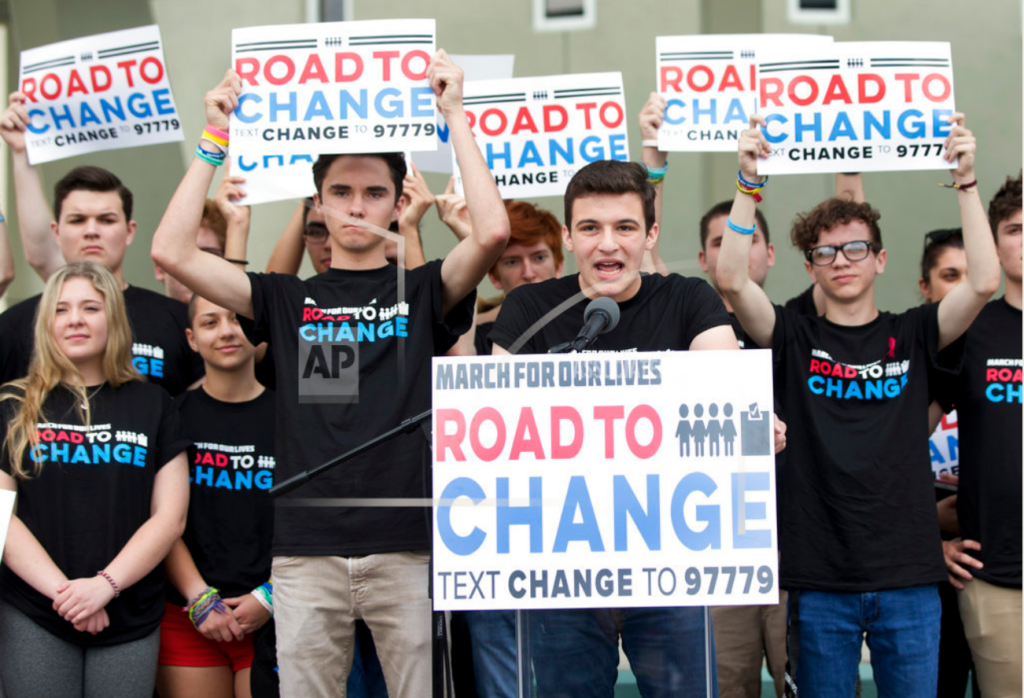
A day after graduating, a group of Florida high school shooting survivors announced they’ll spend their summer crisscrossing the country, expanding their grass-roots activism from rallies and schools walkouts to registering young voters to help accomplish their vision for stricter gun laws. David Hogg, Emma Gonzalez, Cameron Kasky, Jaclyn Corin and about two dozen other students who have become the faces and voices of bloodshed in American classrooms stood together Monday in matching black “Road to Change” T-shirts, holding placards at a park just down the street from Marjory Stoneman Douglas High School where 17 were killed on Valentine’s Day. In the months since the shooting, the students have rallied hundreds of thousands across the country to march for gun reform, including a massive turnout in Washington, D.C., in March. But the young activists say rallies won’t matter unless that energy is funneled into voting out lawmakers beholden to the National Rifle Association this November. “This generation is the generation of students you will be reading about next in the textbooks. … These are students who are changing the game,” Kasky said. “It’s not just my friends and I from Stoneman Douglas High School. We are part of something so much greater. Students from all over the country are beginning to get up, rally, move in the right direction and realize just how important it is to exercise our freedom.” He cited dismal statistics noting voter turnout in the last midterm elections was the lowest since World War II. That’s why the students are planning more than 25 stops in a two-month nationwide tour hitting Iowa, Texas, California, South Carolina, Connecticut and others, targeting communities rocked by gun violence or where lawmakers supported by the NRA are running for office. Kasky said they’re focusing on the 4 million people turning 18 this year. “Voting has so often become a chore to people; people have so often shrugged it off as something that’s not important,” he said. Hogg helped organize a massive voter registration drive last week at 1,000 schools in 46 states. He and other students are advocating for tighter regulations on guns, including universal background checks and training for people who own AR-15s and similar semi-automatic rifles. The students said they are funding the tour through donations but declined to say how much they’ve raised. March For Our Lives received heavy financial and publicity support from celebrities including Oprah Winfrey and George Clooney. They’re also backed by a tightknit, wealthy community where parents and residents have lent them office space and professionals have also been coordinating publicity for them. In addition to the national tour, the students are also planning a separate tour in Florida, targeting every congressional district in the Sunshine State. “We’re working straight through with very minimal breaks because we’re trying to get to as many places as possible, meet as many people as possible,” said Gonzalez, who graduated Sunday. “We’re trying to help stop this before it comes to other places because bullets aren’t picky.” Gonzalez and Corin said their favorite part of activism has been connecting one-on-one with students across the country just like them. Corin recently traveled to Kenya to speak about engaging young activists The tour will begin June 15 in Chicago, where the Florida students will join the Peace March, led by students from St. Sabina Academy. Some of the Chicago students who spoke at the Washington rally and will join the Florida group at a few other stops, Corin said. She said they’re making calls to the student clubs and groups that held their sibling marches and walkouts across the country to encourage voter registration. “Our school is right down the road. Our lives are completely changed forever, and we are dedicating our lives to this issue,” said Corin. Also Monday, a local task force released 100 recommendations for improving school safety, but noted it will be difficult to fund the measures, which include hiring additional school counselors, therapists and school police officers. The Broward County task force also recommended random searches at schools, raising the heights of fences around schools, adding metal detectors and window coverings to conceal students, keeping classroom doors locked at all times and installing cameras to monitor every inch of school grounds. “We would love to be able to put every one of these recommendations into place right now, but the reality is we don’t have all the resources to do that,” said Beam Furr, mayor of the Broward County Board of County Commissioners. Republished with permission from the Associated Press.
Standing with Publix and the Second Amendment tomorrow and in the future
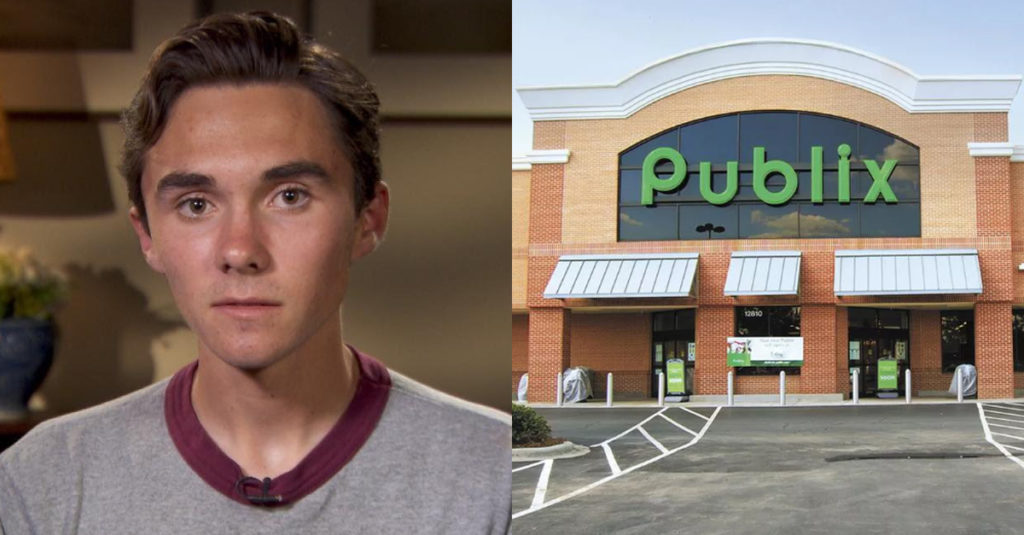
Parkland survivor David Hogg — currently one of the nation’s most outspoken, anti-gun advocates — is making headlines yet again. He’s unsuccessfully called for boycotts of Fox News host Laura Ingram and then BlackRock and Vanguard but why let those failures keep him down if at first and second times you don’t succeed Hogg clearly believe you should try again. This time he’s calling for the boycott and a “die in” of Publix supermarkets tomorrow (Friday, May 25, 2018), because the central-Florida based grocer supported Rep. Adam Putnam, an NRA-endorsed candidate, in the state’s gubernatorial election. His tweet says he’s going to be crashing his local stores but invites others to join at other locations. Meaning even here in Alabama we may see an activists or two (however unlikely) in our stores. .@Publix is a #NRASellOut In Parkland we will have a die in the Friday (the 25th) before memorial day weekend. Starting at 4pm for 12 min inside our 2 Publix stores. Just go an lie down starting at 4. Feel free to die in with us at as many other @Publix as possible. — David Hogg (@davidhogg111) May 23, 2018 While I wholeheartedly disagree with both Hogg’s message and his tactics (hello, encouraging people to go lay down in grocery stores is absurd) I do applaud the fact that he’s engaged. I’ve said it before that my support of constitutional rights, in this case the First Amendment doesn’t just apply to those I agree with. I’m all for protecting the rights of those I disagree with if only the other side felt the same. That said, Hogg’s right to assembly, in this case, is up to Publix what happens once they’re there. I for one and hoping they don’t idly stand by while people make a scene in their stores and disrupt the lives of those simply going about their daily business trying to feed themselves and their families. Even the leftist (or are they progressive?) organization, ACLU will tell you that when protesting on private property the property owners have the right to tell you to leave. I see this as a as call to arms (figuratively speaking of course – Disclaimerfor those who would say I’m encouraging otherwise) to those of us who support Second Amendment rights and Publix’s right to support the candidates of their choice, to show up at our local Publix tomorrow and spend our money in opposition to the sideshow that Hogg is trying to create. What Hogg (or more accurately the gun control lobby and agenda pushers whispering in his ear) is focusing on is Publix’s political donations. What he misses is how much Publix does for the communities around its stores. Not just in Florida where they are based, but in every state, including Alabama where they have locations. I’ve researched Publix and its charitable giving. The company gives a TON of money to the Yellowhammer State and to entities that support our local communities. Here are just a few highlights of their Alabama-based charitable giving in just the last year: $500,000 in Alabama to help alleviate hunger as part of a wider, $5 million donation Four Alabama Habitat for Humanity affiliates supported to build houses and foster hope as part of a $5 million donation $569,100 to the Central United Way of Alabama Join me tomorrow in shopping at one of Publix’s 68 Alabama stores in a public show of support to thank them for all that they do in our neighborhoods. We cannot let our voices be drowned out by the voices who fail to to offer true and real solutions to the tragic shootings happening in our schools, but instead are painting good companies like Publix as bad guys.
GOP-hopeful Rich Hobson is giving away AR-15 to celebrate the 2nd Amendment
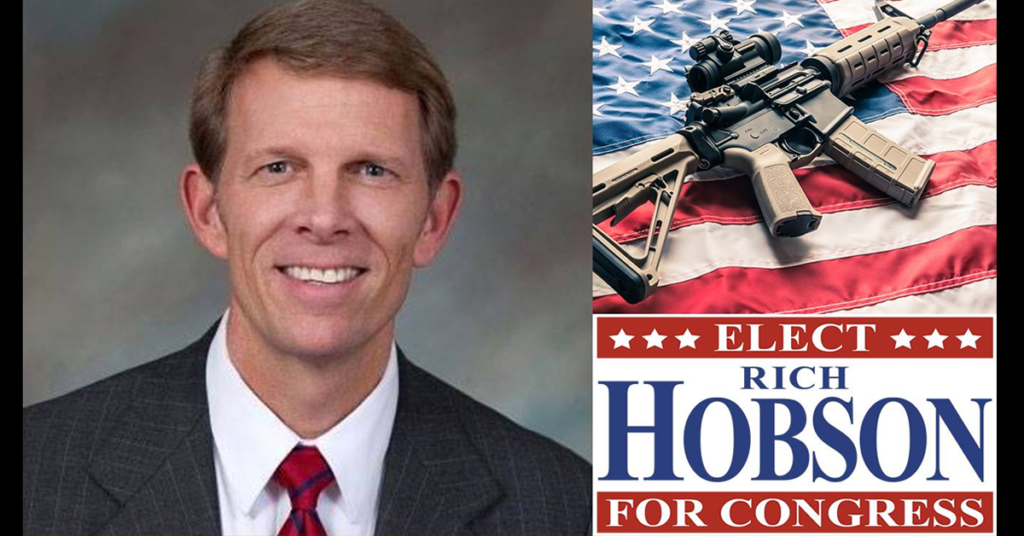
Roy Moore’s former campaign aide and candidate for Alabama’s Second Congressional District is giving away an AR-15, in an effort to draw importance to the Second Amendment. “Get a Free AR-15 for freedom!” Rich Hobson declares on his website. The campaign made the announcement Tuesday that it will hold a drawing to give away a Smith & Wesson AR-15 rifle on Memorial Day. “The name will be drawn on Memorial Day because “[i]t seems only fitting that we would do so on the day that we use to honor those who died defending our freedom,” said Hobson. “America was founded on the idea that people were made to rule themselves. The framers of our Constitution acknowledged that our rights were from God and that our government was to be formed only by the consent of the governed. This is something I believe to my core,” Hobson explained. “But our Founding Fathers also realized that freedom is not possible unless our citizens act with self-restraint, govern their own morality, and take responsibility for every basic need in our life. To that end, true Americans are expected to be hard-working, responsible, and prepared. Because of that, I believe that it is right and proper for every family in the country to own an AR-15 Defense Rifle.” According to a website dedicated to the giveaway, participants must be at least 18-years of age and meet all legal requirements to be a gun owner under federal, state, and local law. Southern Outdoor Sports in Dothan, Ala. will handle the necessary background checks and other legal requirements. The deadline for entry is 12:00 noon CT on Monday, May 28. The publicity stunt is a familiar one for Republican candidates. Just this month, a county judge candidate in Kentucky, Myron Miller, did the same thing. Missouri U.S. Senate-hopeful Austin Petersen launched his second AR-15 giveaway in April, behind Kansas Congressional hopeful Tyler Tannahill’s giveaway in February. Hobson joins for Member of Congress Bobby Bright, State Rep. Barry Moore and Army veteran Tommy Amason in challenging Martha Roby in the June 5 Republican primary. The winner will go on to face whomever prevails from the Democratic primary — Tabitha Isner or Audri Scott Williams — in the Nov. 6 general election.


